You want to make it in Hollywood? Sure you do. You and everyone else. Actor, director, writer, it doesn’t matter what you want to do, another million want it too, and they’ll do anything to get it. How far will you go? And how will you get there? Will you take Pico? To Colorado? To Las Palmas?!?! So many choices, so many roads, all fraught with danger.
The streets of Hollywood are littered with corpses. Not literally littered. I mean, sure, you go to L.A., there’s dead bodies here and there, but if you watch your step, you won’t trip over but a few of them. Figuratively speaking, though, the place is one giant morgue, the letters of the Hollywood sign its tombstones. You can’t swing a dead cat in Hollywood without hitting a failed career. And if you want to make it in Hollywood, you’ll be swinging plenty of dead cats.
In this week’s Mind Control Double Feature, we venture along two of Hollywood’s most notorious roadways and come upon two terribly wrecked careers. Perhaps the stories told here are more metaphor than reality. Or perhaps not. In any case, when you’re in Hollywood, you’d better watch where you drive.
Sunset Boulevard (1950)
The fate of aspiring screenwriter Joe Gillis (William Holden) is not a secret, and not only because Sunset Boulevard is so very famous and beloved a film. The movie opens with his dead body floating face-down in a swimming pool. Though certainly dead, Joe, in voice-over, proceeds to tell us his story in flashback.
Director/writer Billy Wilder may have made his masterpiece in Sunset Boulevard. Then again, he also made the quintessential film noir, Double Indemnity, and Ace in The Hole, and The Lost Weekend, and The Apartment, and…well, yeah. The man was one of the greats.
But Sunset Boulevard. It doesn’t get any better. Joe Gillis, hack writer, broke as hell, spending more time hiding his car from the repo men than writing, finds himself speeding along Sunset (chased by said repo men) when a tire blows out. He veers up a driveway and into the conveniently open garage of a vast, old, crumbling mansion.
And so it begins. The mansion’s owner is one-time silent film star Norma Desmond (Gloria Swanson). She lives with her butler, Max (Erich von Stroheim), and her pet chimp, recently deceased. In fact, when Joe arrives, Norma mistakes him for the undertaker.
It’s perfectly reasonable to view Sunset Boulevard as a film noir, but better still to see it as a horror story. Death pervades it. It is, after all, narrated by a corpse, and set in what is essentially a mausoleum, populated by wax dummies. And Norma? She’s the monster. A forgotten star, she wants desperately to a make a comeback with a script she’s spent years and years writing, the story of Salome. Joe’s a screenwriter? Marvelous. She hires him to rewrite it.
She also has him move in. She buys him clothes. Gives him money. Consumes him. And Joe? He doesn’t exactly like it. But he doesn’t exactly not like it, either. After all, he needs the money. He tries to get away, feebly, but always comes back. She’s in love with him. She won’t let him get away.
Joe is a peculiar lead character for a popular film. He’s got so many chances to be a better person, to do the right thing, chances he never quite takes. He’s a hack writer, and a hack person, too.
You already know where the story is headed—it ends as it begins, with Joe floating dead in a pool. But how he gets there is a twisted business indeed. As for Norma, in the end, she gets her close-up.
Mulholland Drive (2001)
David Lynch’s Mulholland Drive is the best, weirdest, most hallucinogenic tearing down of the Hollywood dream ever made. It is itself a kind of dream, with a structure and meaning of renowned impenetrability. Or so it is said. I find it to be surprisingly straightforward, in a roundabout way. If one may be allowed to travel a straight line in circles. If anyone is, it’s Lynch.
Describing the plot in any detail is a poor idea, since they very thing so confusing in the film is what is real, what isn’t, and whether determining the difference is important. What makes the film so powerful is that its meaning is communicated in the manner of a dream. The moment you try to describe it rationally, it all falls apart, but you know what it means. It’s so obvious! This is Lynch’s gift: the ability to communicate his subconscious to ours. He’s a smart man. He likes the meaning to remain unspoken. He’s never told interviewers what he thinks Mulholland Drive means. He didn’t even tell his actors.
To sum it up briefly and literally, Mulholland Drive tells a story of Hollywood. An aspiring actress, who may or may not be named Betty or Diane (both played by Naomi Watts), comes to town from the sticks. She tries out for parts. If we believe the one audition we see, she’s one hell of an actress. On the other hand, the audition may only show how great she wishes she were.
Meanwhile, one dark night a mysterious woman played by Laura Elena Herring escapes from a limo, in which she was about to be murdered, on Mulholland Drive. She has forgotten who she is. She hides out in the bungalow of Betty’s aunt, where Betty finds her, and mistakes her for a friend of her aunt’s. The woman calls herself Rita (after spotting a movie poster for Gilda), but has no memory of who she is. She and Betty investigate her past, and in the process fall in love.
And…yeah. That’s enough plot for you. There’s an asshole movie director, an ominous cowboy, a Winkies diner and a monster living behind it—the usual stuff in a Lynch movie. But this is not a usual Lynch movie. It’s one of his very best, up there with Blue Velvet.
Its history is peculiar, too. Much of the movie was originally shot as a TV pilot. ABC turned it down, leaving Lynch wondering what to do. He describes sitting down one night and having everything he’d shot appear to him from a different angle, thus showing him the way to finish it. He wrote and shot what would become the final twenty minutes, and re-edited the first two hours. The result makes perfect sense!
Well. More or less. It might be said that the first two hours—between a head hitting a pillow, and Diane waking up from that same pillow—is a dream, and the remainder the reality. A million tiny clues in between give credence to this view. But there are those who disagree with such a clear distinction. It’s a movie that means different things to everyone who sees it, and you’re going to have to decide for yourself what to make of it.
One thing is certain: like Sunset Boulevard, Mulholland Drive is a film noir horror story, a cautionary tale, a peek at the underbelly of the Hollywood dream.

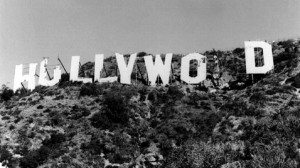
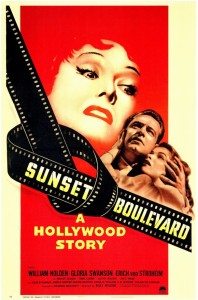
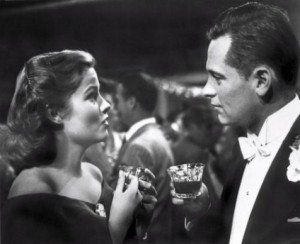
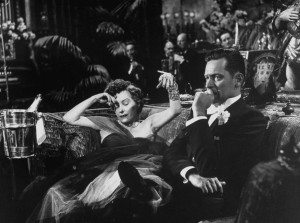
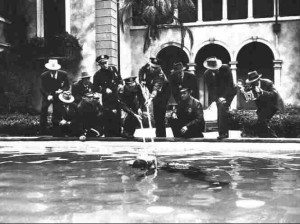
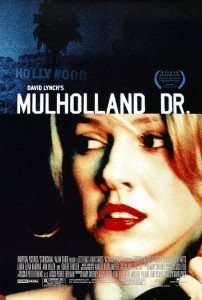
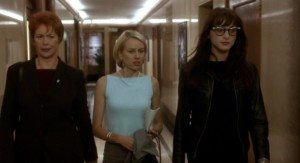
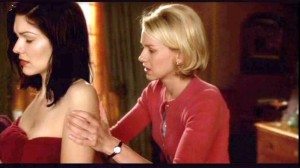
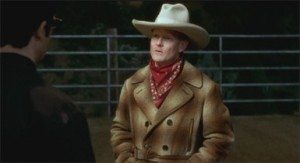
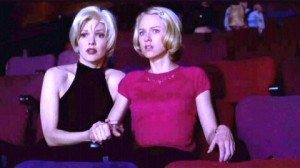
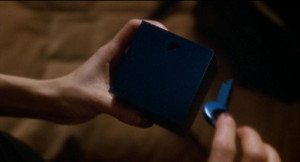
I approve of this double feature, even though I’m asleep and dead in the pool.